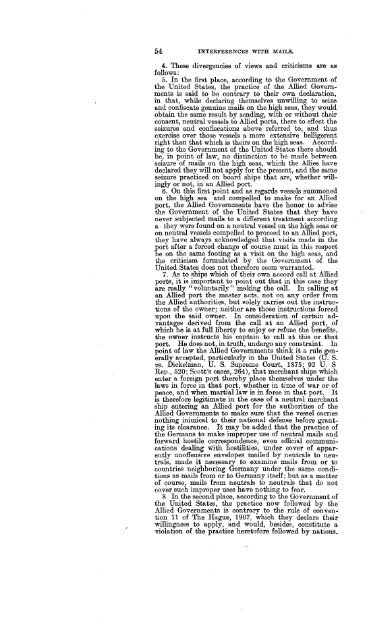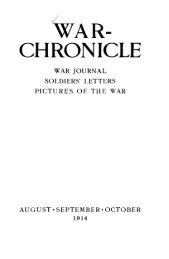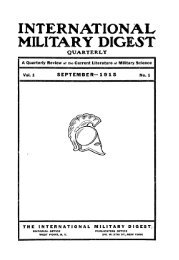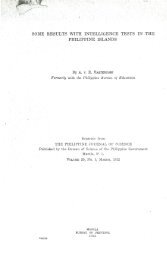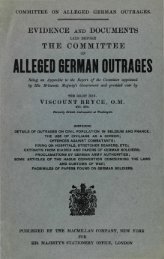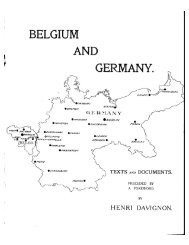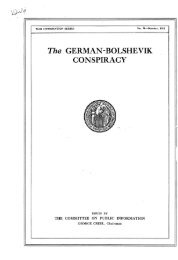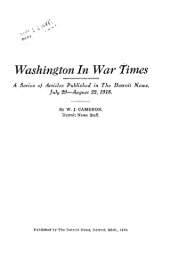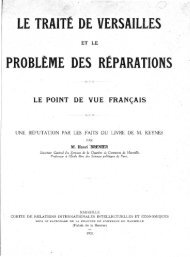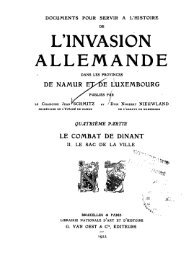DEPARTMENT OF STATE.
DEPARTMENT OF STATE.
DEPARTMENT OF STATE.
Create successful ePaper yourself
Turn your PDF publications into a flip-book with our unique Google optimized e-Paper software.
54 INTERFERENCES WITH MAILS.<br />
4. These divergencies of views and criticisms are as<br />
follows:<br />
5. In the first place, according to the Government of<br />
the United States, the practice of the Allied Governments<br />
is said to be contrary to their own declaration,<br />
in that, while declaring themselves unwilling to seize<br />
and confiscate genuine mails on the high seas, they would<br />
obtain the same result by sending, with or without their<br />
consent, neutral vessels to Allied ports, there to effect the<br />
seizures and confiscations above referred to, and thus<br />
exercise over those vessels a more extensive belligerent<br />
right than that which is theirs on the high seas. According<br />
to the Government of the United States there should<br />
be, in point of law, no distinction to be made between<br />
seizure of mails on the high seas, which the Allies have<br />
declared they will not apply for the present, and the same<br />
seizure practiced on board ships that are, whether willingly<br />
or not, in an Allied port.<br />
6. On this first point and as regards vessels summoned<br />
on the high sea and compelled to make for an Allied<br />
port, the Allied Governments have the honor to advise<br />
the Government of the United States that they have<br />
never subjected mails to a different treatment according<br />
a they were found on a neutral vessel on the high seas or<br />
on neutral vessels compelled to proceed to an Allied port,<br />
they have always acknowledged that visits made in the<br />
port after a forced change of course must in this respect<br />
be on the same footing as a visit on the high seas, and<br />
the criticism formulated by the Government of the<br />
United States does not therefore seem warranted.<br />
7. As to ships which of their own accord call at Allied<br />
ports, it is important to point out that in this case they<br />
are really "voluntarily" making the call. In calling at<br />
an Allied port the master acts, not on any order from<br />
the Allied authorities, but solely carries out the instructions<br />
of the owner; neither are those instructions forced<br />
upon the said owner. In consideration of certain advantages<br />
derived from the call at an Allied port, of<br />
which he is at full liberty to enjoy or refuse the benefits,<br />
the owner instructs his captain to call at this or that<br />
port. He does not, in truth, undergo any constraint. In<br />
point of law the Allied Governments think it a rule generally<br />
accepted, particularly in the United States (U. S.<br />
vs. Dickelman, U. S. Supreme Court, 1875; 92 U. S<br />
Sep., 520; Scott's cases, 264), that merchant ships which<br />
enter a foreign port thereby place themselves under the<br />
laws in force in that port, whether in time of war or of<br />
peace, and when martial law is in force in that port. It<br />
is therefore legitimate in the case of a neutral merchant<br />
ship entering an Allied port for the authorities of the<br />
Allied Governments to make sure that the vessel carries<br />
nothing inimical to their national defense before granting<br />
its clearance. It may be added that the practice of<br />
the Germans to make improper use of neutral mails and<br />
forward hostile correspondence, even official communications<br />
dealing with hostilities, under cover of apparently<br />
unoffensive envelopes mailed by neutrals to neutrals,<br />
made it necessary to examine mails from or to<br />
countries neighboring Germany under the same conditions<br />
as mails from or to Germany itself; but as a matter<br />
of course, mails from neutrals to neutrals that do not<br />
cover such improper uses have nothing to fear.<br />
8. In the second place, according to the Government of<br />
the United States, the practice now followed by the<br />
Allied Governments is contrary to the rule of convention<br />
11 of The Hague, 1907, which they declare their<br />
willingness to apply, and would, besides, constitute a<br />
violation of the practice heretofore followed by nations.


